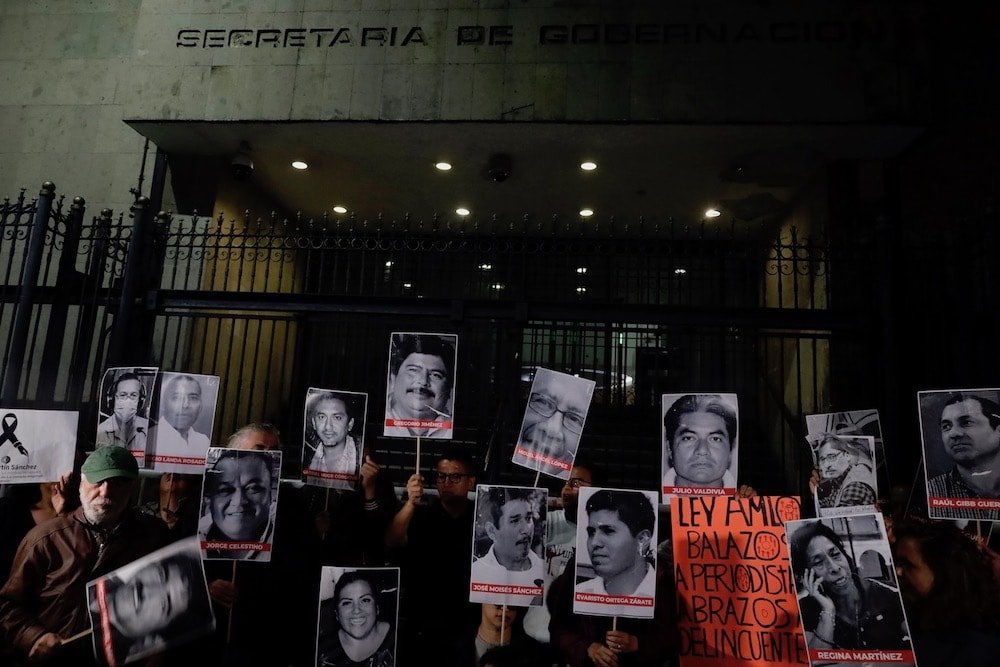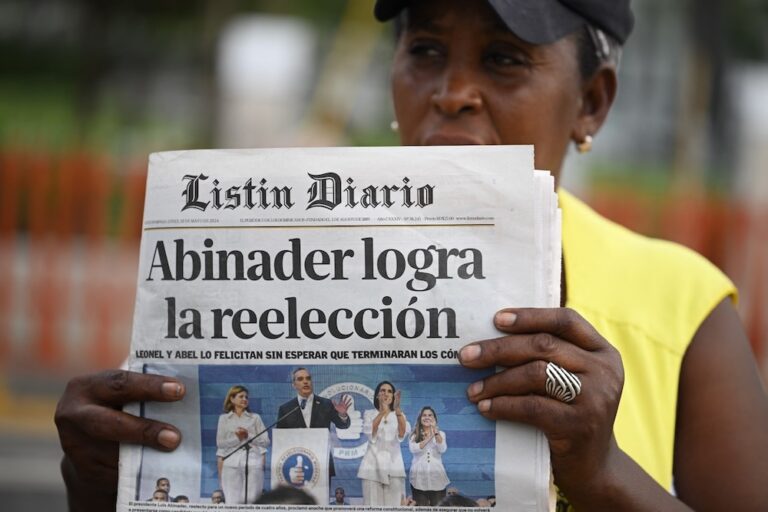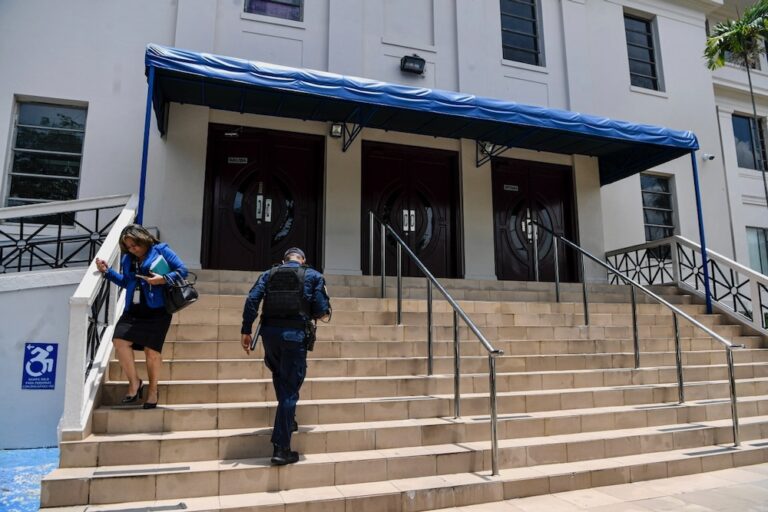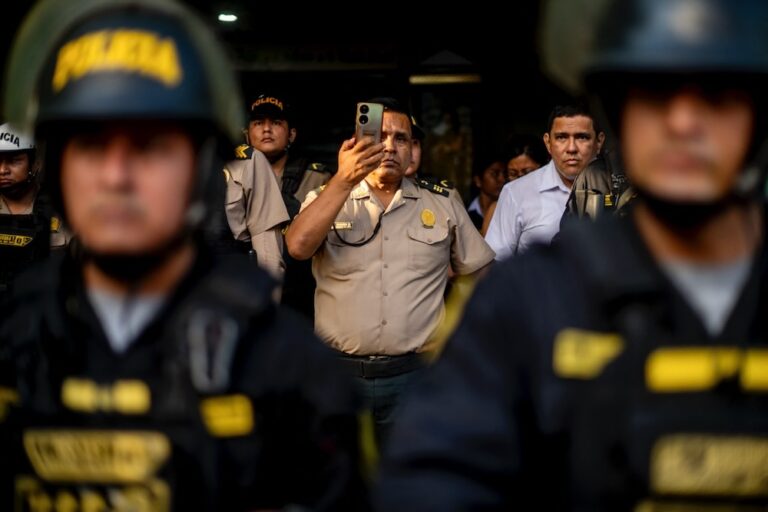July 2023 in the Americas: A free expression round up produced by IFEX's Regional Editor Laura Vidal, based on IFEX member reports and news from the region.
As press freedom faces rising threats in Ecuador and extremist anti-press sentiment escalates in Peru, Canada grapples with an unprecedented news blockade by major social platforms. Guatemala’s democracy teeters on the brink amid election uncertainty and attacks against the press, while in Mexico, the grim count of murdered journalists continues to climb.
Mexico: Unchecked violence
We are running out of words to tell the story of violence against journalists in Mexico. Only in July, Luis Martín Sánchez and Nelson Matus were killed in the provinces of Guerrero and Nayarit, two others were kidnapped – and later released –, and a shooting attack was reported against the administrator of two Facebook local news pages. All grim reminders of the dangerous environment journalists in Mexico have to face to do their work.
The Committee to Protect Journalists (CPJ) underlined that there has never been a real commitment to freedom of speech or to protection and clarification through judicial investigations in Mexico. Just last year, ARTICLE 19 Mexico and Central America documented at least 696 acts of aggression against the press. In other words, one every 13 hours.
While organised crime seems to be primarily responsible for murders, the state continues to be one the main aggressors journalists face in the course of doing their everyday work. Pressure and harassment from economic and political powers are also persistent, all amidst blind and indifferent authorities. Journalists report being “invisible” and having “no guarantee to come back home from work;” or realising, after an attack, that the worst mistake they made was just “doing my job”.
Paula Saucedo, from ARTICLE 19 Mexico and Central America, captured the situation in interview with CNN en español.
“We can’t keep counting the dead in Mexico. We can’t keep counting missing journalists, exiled journalists, displaced journalists, murdered journalists. They are not just another number, they are journalists who have families.”
She went on to say: “It is having a great impact on the journalistic community, a great impact on Mexican society in terms of access to information, and there is no clear response from the government of Andrés Manuel López Obrador, as there was not from the previous governments, on what they will do to prevent this systematic violence against the press.”
Ecuador on edge
A report recently released by CPJ paints a worrisome picture of press freedom in Ecuador. “Ecuador on the Edge: Political Paralysis and Increasing Crime Pose New Threats to Press Freedom,” written with the participation of local organisations including IFEX member Fundamedios, shines a light on the escalating threats journalists face against a backdrop of political stalemate and spiralling crime rates.
Political uncertainty seems to be interfering with responses by a government that does, however, seem to understand the dimensions of the crisis. As a result, the press’s capacity to deliver accurate and independent reporting is impeded. Violence, both in urban spaces and more remote areas, is the main concern: two journalists were forced to flee due to death threats; various media outlets received explosives by mail; and certain reporters were compelled to be accompanied by security forces to cover remote areas, where entire communities have turned into so-called “zones of silence” due to press intimidation.
Journalists are increasingly facing threats and violence when attempting to report on crime. The situation in the northern coastal province of Esmeraldas, bordering Colombia, for example, shows how violence is fostering a culture of silence. According to local reporter Arturo Torres, the 2018 murders of Javier Ortega, Paúl Rivas, and Efraín Segarra from the newspaper El Comercio signalled the beginning of an escalation in attacks against the press.
Journalists, particularly women, face a disturbing level of violence, as highlighted by Fundación Periodistas sin Cadenas. They are victims of various forms of harassment and violence from their sources and their superiors, as well as when reporting on social protests.
Peru: Threats from ‘La Resistencia’
The extremist group “La Resistencia” is making headlines in Peru, stoking anti-press sentiment and intimidating journalists. Reports from CPJ and the Institute of Press and Society of Peru (IPYS) highlight a concerning increase in the group’s acts of aggression towards the media. La Resistencia’s tactics include spreading false information, employing verbal and physical violence, and engaging in cyber harassment.
CPJ reports that La Resistencia’s tactics revolve around creating and disseminating false information to discredit the media and individual journalists. They fuel distrust in the media and hostility towards journalists, thereby impeding their ability to report freely. The group’s tactics are not limited to misinformation. IPYS reports multiple incidents where members of La Resistencia physically attacked and insulted journalists.
The hostility is also directed toward political figures and targets media organisations. IPYS documented an incident where the group hurled insults and threats outside a radio station in Lima. The actions are endangering journalists’ physical safety, their mental health, and their ability to do their work.
The collective has known ties to influential figures in Peruvian politics and society. The group includes former police officers and military personnel, advocates for conservative family values, and rallies behind the slogan: “God, homeland, and family.”
Canada: News blockade by Meta/Instagram
In an escalation of tensions between digital platforms and regulating efforts from governments, Meta, the parent company of Facebook and Instagram, has decided to block users in Canada from accessing Canadian news content. The measure came as a response to the recent passage of a Canadian bill that requires tech giants to pay for the news and information content from Canadian outlets shared on their platforms.
This groundbreaking law mandates that digital companies negotiate fair commercial deals with Canadian news providers or face binding arbitration. The law’s proponents argue it aims to rectify the imbalance in the digital ecosystem where tech companies profit from journalistic content without adequately compensating the producers.
Meta’s reaction to this legislation has been vehement. The company has labelled it as “fundamentally flawed” and claims it overlooks the practical realities of their platforms’ operation. As a response, Meta has chosen to block all Canadian news content from its Facebook and Instagram platforms for users based in Canada.
Guatemala: Deepening threats to democracy and press freedom
The stability of Guatemala’s democracy seems to be hanging by a thread. Candidate Bernardo Arévalo’s unexpected advancement to the second round was marred by an illegal suspension of his party, Movimiento Semilla, intensifying concerns. This obstruction was driven by the Ministry of Public Prosecution, led by Attorney General Consuelo Porras, and executed by the Special Prosecutor’s Office Against Impunity (FECI), headed by prosecutor Rafael Curruchiche. They conducted an illegal raid at the Supreme Electoral Court of Guatemala headquarters (with armed individuals wearing masks, to instil fear) to obtain documentation about Movimiento Semilla.
The move is seen as a stark attack on the democratic process and public sentiment and sparked broad international condemnation,
Another grave concern is the ongoing deterioration of press freedom, as highlighted in a report following an international mission that took place earlier this year. The report describes the press in Guatemala as under siege, facing threats of violence, intimidation, and legal and administrative harassment. Journalists are forced to self-censor to avoid reprisals, leading to a climate of fear that stymies critical reporting and undermines the democratic process. It stressed that these are not isolated incidents, but rather indicative of a systematic attempt to silence independent and critical voices.
The case of renowned journalist José Rubén Zamora stands as a poignant example of the deteriorating situation. His imprisonment has triggered an international outcry and a campaign demanding his release,
In brief
The Inter American Press Association warned of the potential risks involved with the proposed commission against disinformation in Chile, expressing concern over potential censorship.
International organisations condemned recent attacks against journalists and human rights defenders in Honduras, demanding improved protections and respect for freedom of expression in the country.
In Nebraska, United States, a teenager who had an abortion was sentenced after Facebook handed over her private conversations as evidence, raising critical concerns about digital privacy and the power tech companies hold over personal information.
——————————————
Editor’s note: Our monthly brief will be on hiatus for August. We look forward to resuming our updates on Freedom of Expression in the Americas in September. Stay tuned!



